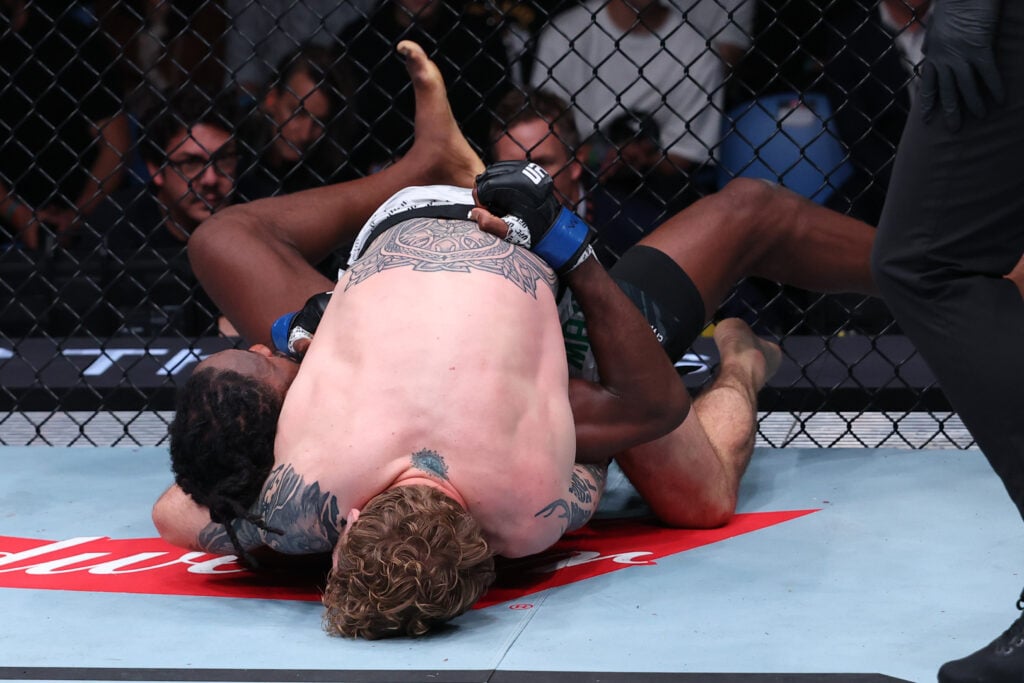UFC Perth promised high-octane action, and it delivered—albeit with a twist of controversy that has left fans and fighters alike debating the fine lines of combat sports officiating. At the heart of this discussion stands a welterweight clash between the resilient veteran Neil Magny and Australia`s own Jake Matthews, a bout that transcended mere competition to become a profound narrative on human fortitude, split-second judgments, and the enduring quest for redemption.
The Guillotine, the Count, and the Controversial Call
The fight began with the usual fervor, but it was in the dying seconds of the first round that the event truly ignited. Jake Matthews, fueled by the roar of his home crowd, locked Magny into a dangerously tight guillotine choke. It was the kind of submission attempt that often signals an imminent end, and for a fleeting moment, it appeared to have done just that.
The referee, observing Magny`s arm seemingly go limp, intervened. The fight was stopped. Matthews and his corner erupted in celebration, believing a hard-earned victory had been secured. Yet, in the chaotic aftermath, Magny, ever the seasoned campaigner, protested vehemently. He was conscious, he insisted, counting down the final seconds of the round, merely “fighting for air” but not out. A re-evaluation, a quick conference, and then, a decision: the fight would continue.

Magny`s Unbroken Spirit: “Just Fighting for Air”
For Magny, a fighter often dubbed the welterweight division`s gatekeeper due to his consistent presence and challenging style, this moment was a true test of his legendary composure. He later revealed his internal monologue during the choke:
“At the end of the round, I was like, the round was already up… The best I could do is just keep holding on for air, keep holding on for blood, to keep that circulation going… As soon as I was expecting the bell to go, [the referee stepped in].”
This wasn`t just physical resistance; it was a profound display of mental fortitude. In a sport where seconds can determine destiny, Magny`s ability to remain lucid, to count down the clock while in the clutches of a formidable submission, is a testament to his veteran savvy. It’s a subtle art, really, being almost unconscious but not quite—a state many can`t fathom.
Matthews` Anguish: Victory Denied, Appeal Launched
On the other side of the Octagon, the emotional toll on Jake Matthews was palpable. To believe you`ve won, only to have that victory snatched away, can be psychologically devastating. Renowned referee John McCarthy even suggested that such an event could lead to an “adrenaline dump,” draining a fighter of crucial energy and focus.
Matthews and his team are now pursuing an appeal with the state combat commission, arguing that the premature stoppage significantly impacted the fight`s outcome. “It’s not easy to switch back on after a referee’s call,” Matthews stated, “but we’ll leave it in their hands and see where it goes. At the end of the day, rules are rules.” This highlights a critical, often debated aspect of combat sports: the human element in officiating and its profound impact on a fighter`s performance and career trajectory.
The Resilient Comeback: Magny`s Second Act
Despite the contentious first round, the fight continued, and Magny, demonstrating why he holds the second-most wins in UFC history, rallied. Shaking off the near-stoppage, he turned the tables on his Australian opponent, ultimately securing a submission victory in the final round. It was a remarkable comeback, turning what could have been a career-defining loss into yet another notch in his belt of resilience. One might even suggest that being prematurely saved from a choke by a referee, only to then secure a submission victory later, is the kind of ironic twist only a “gatekeeper” could pull off with such panache.
Broader Implications: The Weight of the Whistle
The Magny-Matthews controversy serves as a stark reminder of the immense pressure on combat sports officials. In a fraction of a second, they must weigh fighter safety against the sanctity of competition. A premature stoppage can deny a fighter a legitimate victory, while a delayed one can lead to serious injury. This delicate balance is what makes officiating perhaps the most thankless job in sports.
As Jake Matthews` appeal moves forward, the MMA community watches closely. The outcome could set a precedent for future contentious referee decisions, adding another layer of intrigue to a sport already brimming with unpredictability. Regardless of the appeal`s result, the UFC Perth bout between Neil Magny and Jake Matthews will be remembered not just for the fighters` skill, but for the controversial moment that encapsulated the thrilling, often frustrating, human drama of the Octagon.

